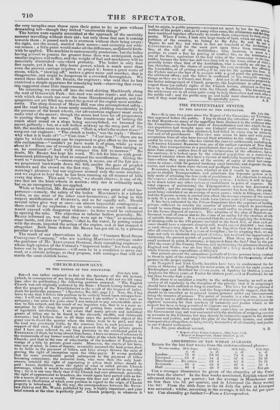CHURCH-ENDOWMENT.
TO THE EDITOR or TUE SPECTATOR.
21st July 1840.
Sire—I was rather surprised to find in the Spectator of the 4th instant, (which, in consequence of any being absent from home, I did not see till some time after its publication,) the following position assumed. " The English Church was not originally endowed by the State : Church history informs its, that the property of the Establishment is the result of the bequest of indivi- duals for particular purposes." (Spectator, No. 627, page 1.) Nov, Sir, I beg leave to say that I believe this position to be entirely based upon misapprehen- sion : I will not speak very positively, because I am neither a lawyer moor ant antiquary ; but some few years since 1 was induced to pay considerable atten- tion to this subject, and the result of my inquiries was, that it is a mere an- sumption by the clergy for the purpose of getting from tinder the power of legislative interference. I am aware that many private and individual grants of tithes arc to be found in the eleventh, twelfth, and thirteenth centuries ; but I believe that in all those cases the particular object of the grant was to direct the quarter where the tithes were to be paid, and that tine land was previously liable, by the common how, to such payment. In support of this view, I shall only say at present that all the private grants that I have seen referred to, arc long posterior to the celebrated grant by ETHF.LRED (I thhde, for being absent from home, 1 have no means of reference to the memoranda of my former search) of the tithes of the whole kingdom to tine Church ; and that in the case of nine-tenths of the benefices of England, no vestige of a title by private grant exists. Moreover, the courts of law have, time out of mind, in cases of dispute, invariably assumed the laud prima facie to be liable to the payment of tithes, and have always thrown the onus of proving the right of exemption upon the tithe-payer. It seems probable that for canoe considerable period subsequent to the payment of tithes becoming compulsory, the manorial lords, who were then the only land- owners, retained the right of appointing to whom. their tithes should be paid : hence, doubtless, arose the rights of what is called private Church patronage, which it would be exceedingly difficult to account for in any other way ; for it is not very likely that if the Church had ever piissessed, generally, the right of appointment to benefices, she would again have parted with so fer- tile a source of power or wealth. Of course this does toot at all affect the ar- gument in illustration of which your position in regard to the origin of Church property is introduced. By the way, the correspondence between Mr. SWYN- FEN JERvis and Mr. WADE, published by you, is highly important ; and your brief remark at the close is perfectly just. Church property, in whatever it had its origin, is public property—revenues set apart by law for the sp. to,1 welfare of the people ; and, as in many other cases, the aristocracy and th- have combined together effectually to render them subservient to their ereele,, parity. Where 1 write, I look over large tracts of land, which are said, in Parlance of the country, to belong to Sir John So and So shin '''6` 'Squire So and So; but which in fact are leasehold of the Archhishilopq CANTERBURY, held for the most part upon three fives, renewable- 6°- fine, at the will of the Archbishop ; who, however, is never lti ' position to exact a fine for putting in another life, on the terminafott d- one of the three, equivalent to the real value of the concession to the lease. holder, because the latter has still two lives left in the lease, either of which; probably better than that of the Archbishop, who is usually an old man: ha
therefore, only the choice of accepting the very moderate line offee
the leaseholder, or of getting nothing if Inc ran his life against the lease, co , ' the Prelate makes the best of it accepts with a good grace the pittance which the aristocrat offers ; and the latter is confirmed in his energetic support,/ things as they arc in Church and State. And yet in all measures proposed fm the better management of Church property, the Legislature is called up°il I, respect these (so-called) rights of the Church lessees, obtained as they flore- been by a fraudulent compact with the Church officers. The hierarchy asi the aristocracy are hr all cases quite ready to help themselves and each admit the public cost : and the public may go and build more churches at their on cost, if they want them. Respeetffilly yours, A. B. cost, if they want them. Respeetffilly yours, A. B.


























 Previous page
Previous page